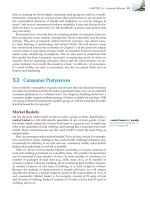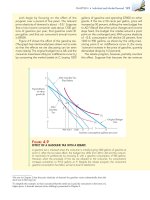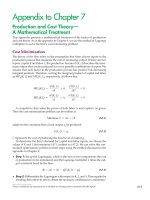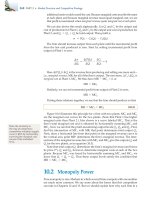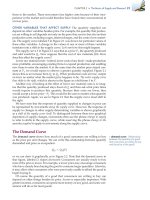(8th edition) (the pearson series in economics) robert pindyck, daniel rubinfeld microecon 453
Bạn đang xem bản rút gọn của tài liệu. Xem và tải ngay bản đầy đủ của tài liệu tại đây (90.59 KB, 1 trang )
428 PART 3 • Market Structure and Competitive Strategy
main course, and dessert, for $20. Then, the customer who loves dessert but couldn’t care less
about an appetizer will order only the main dish
and dessert, and spend $18 (saving the restaurant
the cost of preparing an appetizer). At the same
time, another customer who attaches a moderate
value (say, $3 or $3.50) to both the appetizer and
dessert will buy the complete dinner.
You don’t have to go an expensive French restaurant to experience mixed bundling. Table 11.6 shows
the prices of some individual items at McDonald’s, as
well as the prices of “super meals” that include meat
or fish items along with a large order of French fries
TABLE 11.6
and a large soda. Note that you can buy a Big Mac,
a large fries, and a large soda separately for a total
of $9.27, or you can buy them as a bundle for $6.99.
You say you don’t care for fries? Then just buy the Big
Mac and large soda separately, for a total of $6.68,
which is $0.31 less than the price of the bundle.
Unfortunately for consumers, perhaps, creative
pricing is sometimes more important than creative
cooking for the financial success of a restaurant.
Successful restaurateurs know their customers’
demand characteristics and use that knowledge
to design a pricing strategy that extracts as much
consumer surplus as possible.
MIXED BUNDLING AT MCDONALD’S (2011)
UNBUNDLED
PRICE
PRICE OF
BUNDLE
SAVINGS
Chicken Sandwich
$10.07
$7.89
$2.18
Filet-O-Fish
$8.97
$6.79
$2.18
$4.69
Big Mac
$9.27
$6.99
$2.28
Quarter Pounder
$4.69
Quarter Pounder
$9.27
$7.19
$2.08
Double Quarter Pounder
$6.09
Double Quarter Pounder
$10.67
$8.39
$2.28
10-piece Chicken
McNuggets
$5.19
10-piece Chicken
McNuggets
$9.77
$7.59
$2.18
Large French Fries
$2.59
Large Soda
$1.99
INDIVIDUAL ITEM
PRICE
Chicken Sandwich
$5.49
Filet-O-Fish
$4.39
Big Mac
MEAL (INCLUDES
SODA AND FRIES)
Data from McDonald’s restaurant menu.
Tying
• tying Practice of requiring a
customer to purchase one good
in order to purchase another.
Tying is a general term that refers to any requirement that products be bought
or sold in some combination. Pure bundling is a common form of tying, but
tying can also take other forms. For example, suppose a firm sells a product
(such as a copying machine) that requires the consumption of a secondary product (such as paper). The consumer who buys the first product is also required
to buy the secondary product from the same company. This requirement is usually imposed through a contract. Note that this is different from the examples of
bundling discussed earlier. In those examples, the consumer might have been
happy to buy just one of the products. In this case, however, the first product is
useless without access to the secondary product.
Why might firms use this kind of pricing practice? One of the main benefits
of tying is that it often allows a firm to meter demand and thereby practice price
discrimination more effectively. During the 1950s, for example, when Xerox had
a monopoly on copying machines but not on paper, customers who leased Xerox

